- Department of Ophthalmology, Beijing Jishuitan Hospital, Capital Medical University, Beijing, China
Background: This study aimed to access knowledge, attitudes and practice (KAP) regarding refractive errors (RE) management among the left-behind children of migrant workers.
Methods: This cross-sectional study was performed by the Ophthalmology Department of Beijing Jishuitan Hospital between July and August, 2023. The KAP scores were assessed using a self-designed questionnaire.
Results: Analysis of 350 questionnaires showed mean KAP scores of 9.21 ± 3.00 (possible range 0–14), 33.23 ± 3.57 (possible range 9–45), and 50.19 ± 5.31 (possible range 14–70), respectively. Pearson’s correlation analysis showed positive correlation was found between knowledge and practice (r = 0.286, p < 0.001), negative correlation between knowledge and attitude (r = −0.150, p = 0.005), and positive correlation between attitude and practice (r = 0.141, p = 0.008). Multivariate logistic regression analysis showed that children’s age (OR = 0.748, 95%CI: 0.632–0.885, p = 0.001), duration away from parents (OR = 0.345, 95%CI: 0.172–0.691, p = 0.003) and RE in parents (OR = 0.405, 95%CI: 0.218–0.753, p = 0.004) were independently associated with knowledge. Relationship to the child other than grandparent (OR = 0.252, 95%CI: 0.064–0.999, p = 0.050), as well as child’s gender (female, OR = 1.671, 95%CI: 1.006–2.777, p = 0.047) and duration of sleep per day (OR = 8.401, 95%CI: 1.473–47.923, p = 0.017) were independently associated with practice. In addition, structural equation modeling also showed positive impact of knowledge on practice (β = 1.251, p < 0.001).
Conclusion: Left-behind children of migrant workers have mostly sufficient knowledge, positive attitude and proactive practice toward RE management, significantly influenced by child’s age, relationship with the child, and duration of living without parents.
1 Introduction
Refractive errors (RE) correspond to the mismatch between axial length and optical power of the eye, leading to the problem in focusing light on the retina (1, 2). Uncorrected RE are the leading cause of visual impairment worldwide and worldwide blindness (3, 4). Global estimates in 2022 indicated that prevalence of uncorrected RE is as high as 2.26–5.85 per 1,000 individuals below the age of 20 years old (5). Recent systematic meta-analysis reports that astigmatism is the most common among RE (14.9%), followed by hyperopia (4.6%) and myopia (11.7%) (6). However, individual reports discuss much higher rates of myopia among school-aged children in China, up to 32.5% or even 75.4% in some populations, such as competitive elementary schools (7, 8). According to the 2020 study, the prevalence of hyperopia and astigmatism is also high among Chinese preschool children, reported as 13.8 and 17.6%, respectively (9). Globally the prevalence of RE in children is increasing as well, partially due to the recent COVID epidemic and increase of eye load during online classes (10, 11).
The Lancet Global Health Commission (12) defines eye health as maximized vision, ocular health, and functional ability, essential to achieve many of the United Nations (UN) Sustainable Development Goals (SDGs). Undetected or uncorrected RE might cause a number of complications in school-aged children, especially in those who represent the vulnerable groups (4, 12). However, in many cases those adverse outcomes are avoidable and could be prevented by providing timely access to the eye care education in order to detect and correct RE (13). In this light, knowledge, attitude and practice (KAP) study might provide aid, as the structured survey method that allows to access the current situation regarding specific prophylaxis methods among target audience and explore barriers for better compliance.
Previously identified and discussed barriers for RE correction include the concerns about cosmetic appearance, cost of spectacles, and inadequate knowledge levels among children, their parents and teachers (13, 14). Some studies reported that older participants are more comfortable with wearing glasses (15), while lack of knowledge and fear of complications become barriers for refractive surgery (16). However, for younger children the main source of knowledge and attitude is their parents or guardians (17–19). At that, the knowledge among parents remain low in many countries, including China (20, 21). Moreover, parental migration is a widespread phenomenon in China and Europe, leading to the millions of children left in the care of grandparents and other guardians (22, 23). Parental migration is detrimental to the health of left-behind children and adolescents, including the evidence of lower correction rate with eyeglasses in myopia (24), but its effect on children’s education and self-care regarding RE is still barely discussed.
This study aimed to explore knowledge, attitudes and practice regarding RE management among left-behind children of migrant workers or their temporary guardians.
2 Methods
2.1 Study design and participants
This cross-sectional study was conducted by the Ophthalmology Department of Beijing Jishuitan Hospital between July and August, 2023, and included left-behind children of migrant workers from the mountainous areas of Hebei, Henan, Jiangxi, Liaoning and Zhejiang Province, China. Due to practical considerations it was not possible to perform eye examination of children during the questionnaire filling, so records of refractive test results from compulsory school examination in the spring of 2023 have been used. The dioptric results were computer refraction results obtained without any cycloplegic drug administration to the eyes. Inclusion criteria: (1) child in the care of guardian is aged 8–14 years; (2) parents have been migrant workers for more than 6 months; (3) child was tested for refractive status with the official medical record without cycloplegic drug administration; and (4) voluntarily participation in this survey. Guardians of children with organic eye diseases, or with incomplete school examination and eye refraction test results were excluded. The study has been ethically approved by the Ethics Committee of Beijing Jishuitan Hospital and informed consent has been obtained from all study participants.
The questionnaire design was referenced from “Kanski’s Clinical Ophthalmology: A Systematic Approach, 9th ed” (25), modified with comments from two chief physicians and professors and tested for reliability (150 copies) with Cronbach’s α = 0.835, suggesting good internal consistency. The final questionnaire was in Chinese (a version translated into English was attached as an Supplementary material Table) and included 4 dimensions of information collection with a total of 47 items. Of these, the basic information consisted of 10 items; the knowledge dimension consisted of 14 items, with correct responses scored as one and wrong or unclear responses scored as 0, with possible scores ranging from 0 to 14. The attitudes and practice dimensions consisted of 9 and 14 items respectively, both using a five-point Likert scale, with scores ranging from 9 to 45 and 14–70, with 5, 4, 3, 2 and 1 or 1, 2, 3, 4, 5 being assigned from very positive, positive, neutral, negative and very negative, respectively. In the Attitude dimension for questions A1, A4, A6, A9 replies “agree” and “strongly agree” were considered positive attitude, while for questions A2, A3, A5, A7, A8 replies “agree” and “strongly agree” were considered negative attitude and reverse score was used. The specific rules of each items in the practice dimensions were showed in the Appendix. “School eye exercises” referred to 1–5 min eye massage exercises under the teacher’s guidance, implemented in all Chinese schools to accelerate blood circulation, relax eye muscles and eliminate eye fatigue (26).
The children from mountainous areas such as Sanhe Area in Hebei, Shangqiu Area in Henan, Shangrao Area in Jiangxi, Chaoyang and Dalian Area in Liaoning, and Jinhua Area in Zhejiang were selected via convenience sampling; questionnaires were distributed in schools (guardians were contacted beforehand and asked to sign informed consent form). All 8 researchers had experience in conducting self-administered questionnaire surveys and underwent the relevant quality control training. All questionnaires were paper-based. If the child is unable to fill in the questionnaire effectively, the temporary guardian or the researchers will help complete the questionnaire. Once questionnaires have been collected, they were screened again by a member of the research team to eliminate incomplete questionnaires and to record data from complete questionnaires. Members of the researcher team checked all questionnaires for completeness, internal coherence and reasonableness.
2.2 Statistical analysis
The statistical analysis software was SPSS 26.0 (IBM Corp., Armonk, NY, USA). Continuous variables were described using Mean ± SD, and comparisons between groups were made using ANOVA. Categorical indicators were described using frequency (percentages). Pearson’s correlation analysis was used to explore correlations among KAP scores. Multivariate logistic regression analysis was applied for factors associated with KAP, using 70% of the score distribution as the cut off value. Univariate variables with p < 0.05 were used for multivariate analysis. Structural Equation Modeling (SEM) was used to explore the pathways between basic information, each KAP items and KAP scores. The SEM was based on the following hypothesis (H): H1: The knowledge had positive effect on attitude. H2: The attitude had positive effect on practice. H3: The knowledge had positive effect on practice. All tests were two-sided, with p < 0.05 indicating statistical significance. Two-sided p-values <0.05 were considered statistically significant.
3 Results
Initially, a total of 471 questionnaires were collected, after elimination of 121 unqualified responses due to incomplete data, a total of 350 (74.31%) valid questionnaires were included for analysis. The majority of guardians of the child were grandparents (93.14%), maternal grandparents (2.86%) or other relatives (4.00%). Among children, 27.14% lived away from parents for >5 years, 39.15% had myopia, 3.71% had hyperopia, and 11.71% had astigmatism. The mean knowledge, attitude and practice scores of participants were 9.21 ± 3.00 (possible range 0–14), 33.23 ± 3.57 (possible range 9–45) and 50.19 ± 5.31 (possible range 14–70), respectively (Table 1).
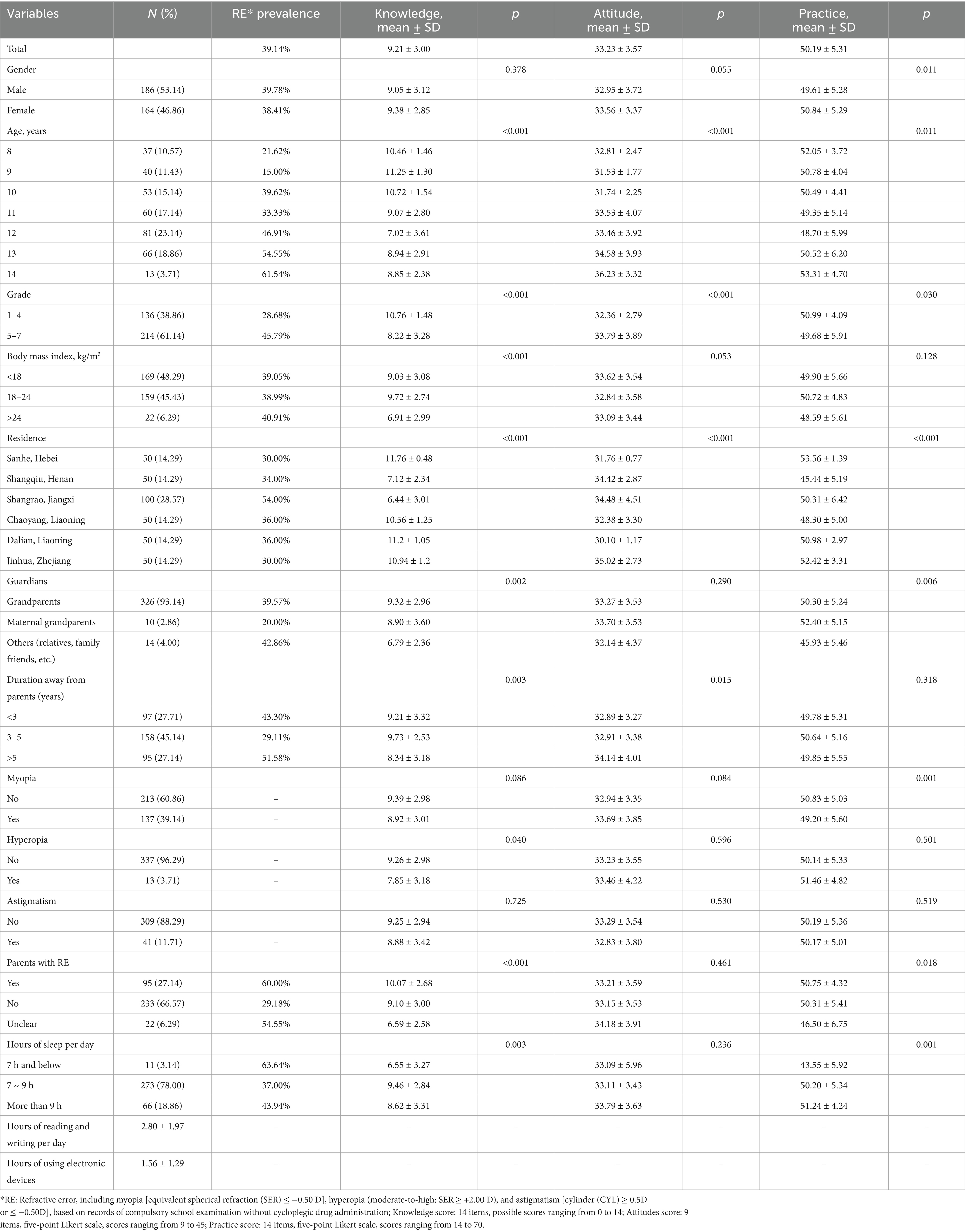
Table 1. Distribution of demographic characteristics and comparison of KAP scores among different subgroups of demographic characteristics.
In the knowledge dimension the question with the highest rate of correct answers was “When child is taking an online course at home, the room should be well lit and the brightness of electronic equipment should be adjusted appropriately, not too bright or too dark” (correct rate of 89.71%). Questions that appeared to be more difficult, with the lowest rate of correct answers excluding control ones, were “Refractive errors include myopia, hyperopia and astigmatism” and “Child can inherit myopia from their parents” (correct rates of 61.14 and 66.57%, respectively) (Table 2).
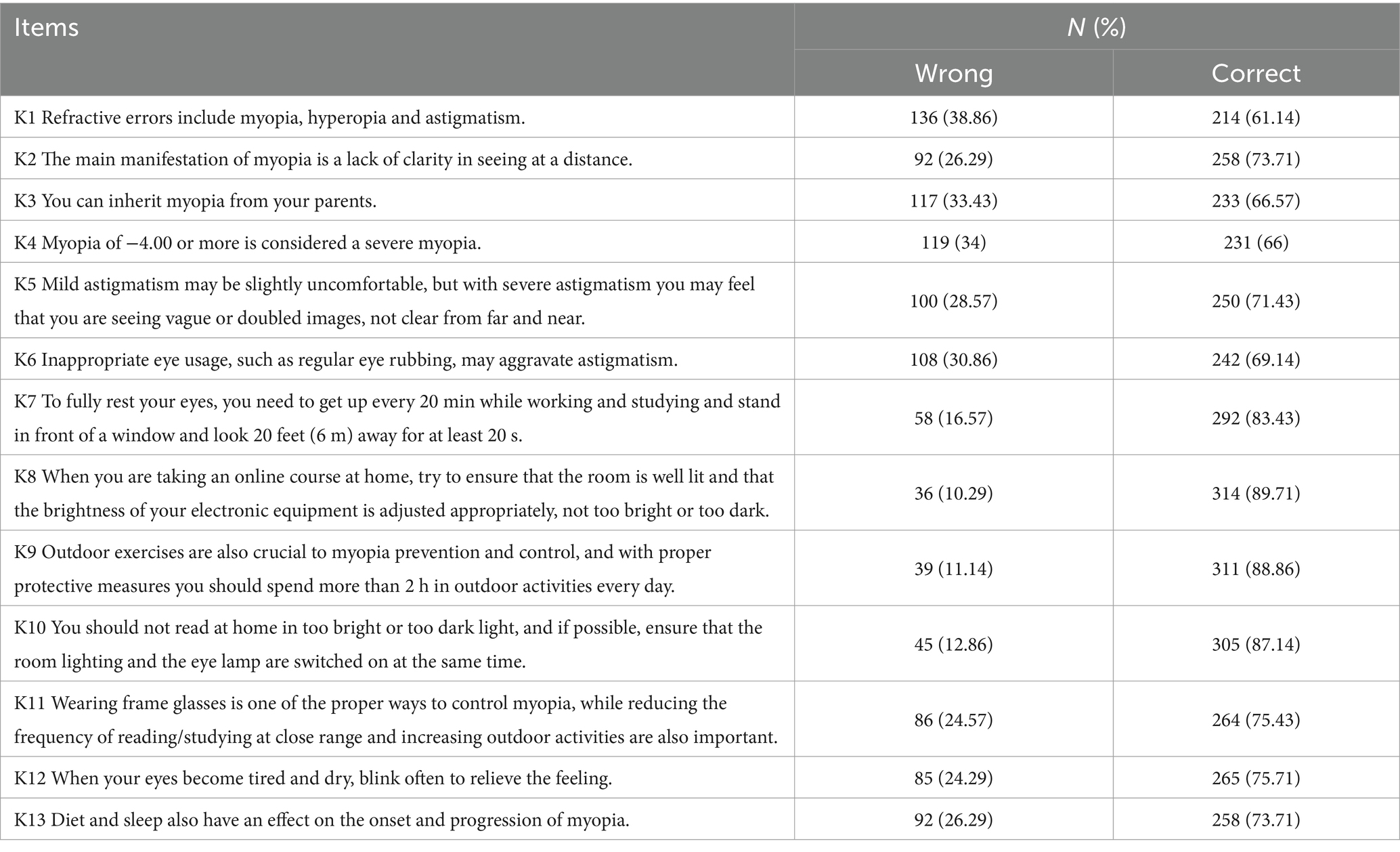
Table 2. Distribution of knowledge scores regarding refractive error among left-behind children of migrant workers.
In the attitude dimension 66.0% agreed and 20.57% strongly agreed to participate in the future promotion activities related to eye care for the sake of children in their care. Questions that provoked disagreement the most were designed this way, such as “it is unnecessary to have eyesight checked regularly” (56.86% disagreed and 22.57% strongly disagreed), “there is no effect of body position during reading or using electronic devices on eyesight” (59.43% disagreed and 32.0% strongly disagreed) and “RE are not a serious problem” (67.14% disagreed and 24.0% strongly disagreed). However, more than 1/3 of participants disagreed that it is necessary to wear glasses even if vision is not clear; 40.86% of participants expressed concerns related to the appearance if RE made it necessary to wear glasses, and 7.71% more reported possible self-esteem problems related to having RE (Table 3).
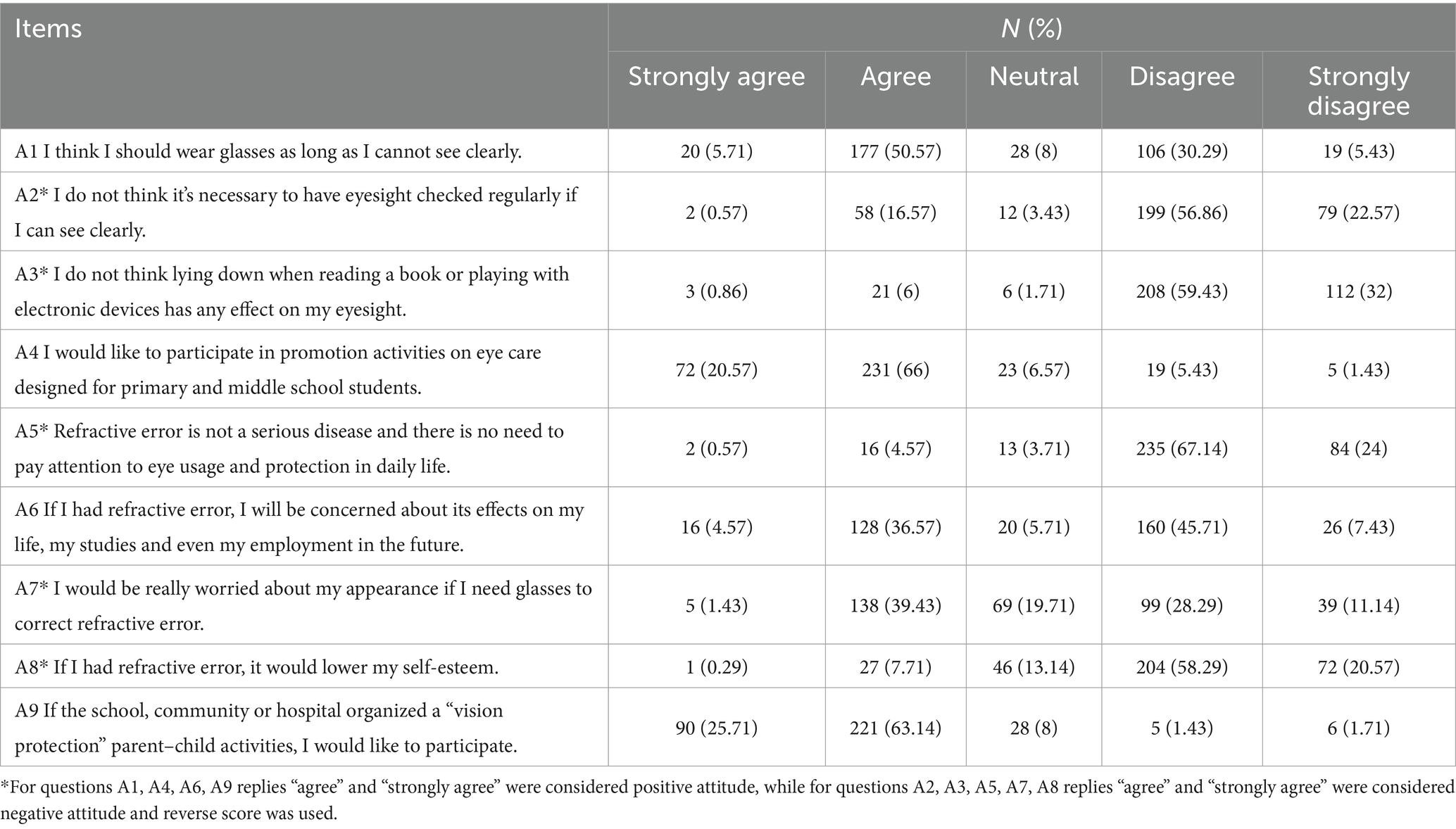
Table 3. Distribution of attitude scores regarding refractive error among left-behind children of migrant workers.
During last year 54.86% of responders participated in seminars or activities related to the eye health care, organized by schools; 91.14% of children performed eye massage exercises controlled by teacher at school, at least occasionally, and 92.0% had their eyesight checked at schools at least once a year. However, around 10% of participants reported to often use electronic devices in the dark or read books, watch mobile phone and other electronic devices while lying down. Finally, majority of participants acknowledged the necessity to visit hospital upon the signs of visual impairment in the child in their care (77.14%) and ensure a rest from reading to prevent tiredness of eyes (76.43%) (Table 4).
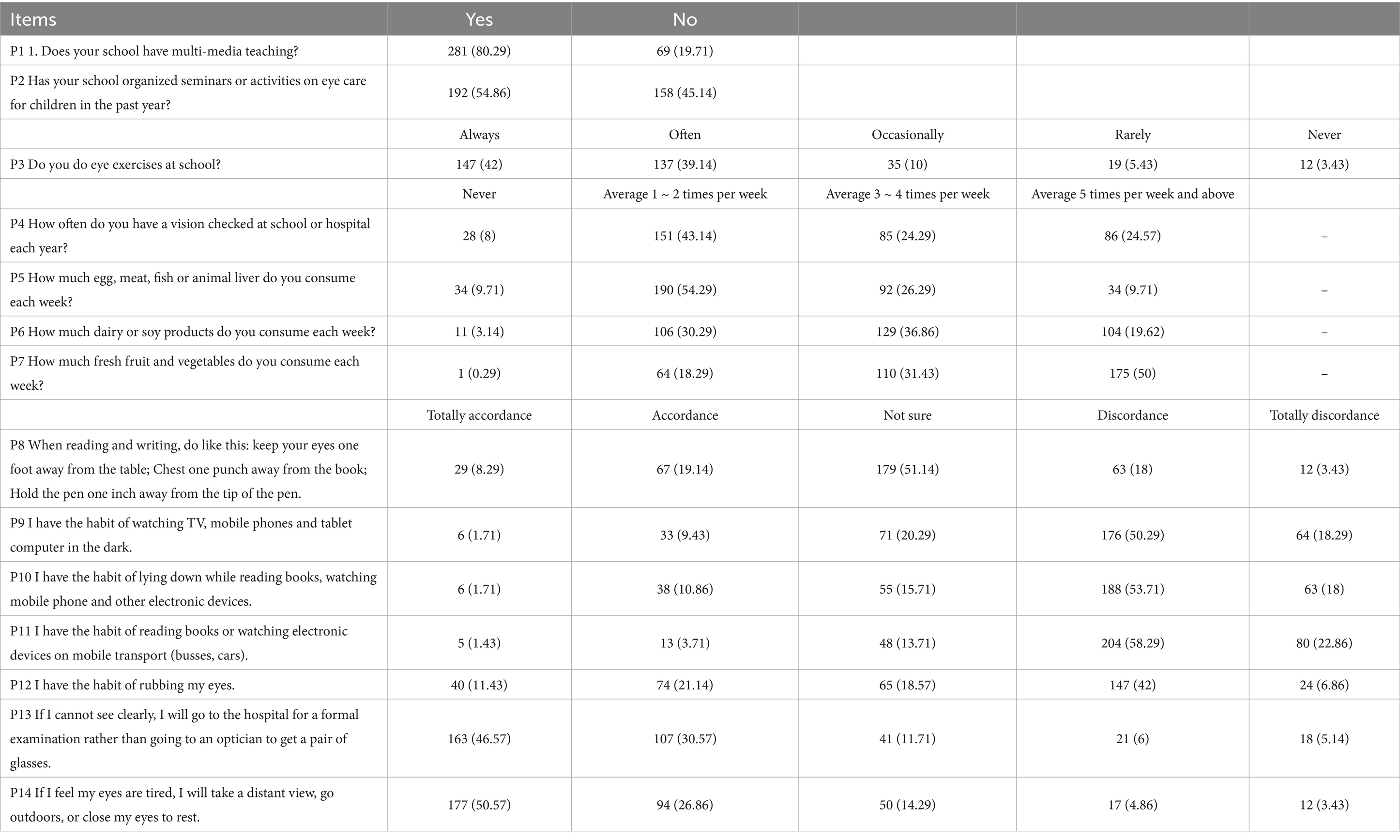
Table 4. Distribution of practice scores regarding refractive error among left-behind children of migrant workers, n (%).
Pearson’s correlation analysis showed positive correlation was found between knowledge and practice (r = 0.286, p < 0.001), negative correlation between knowledge and attitude (r = −0.150, p = 0.005), and positive correlation between attitude and practice (r = 0.141, p = 0.008). Multivariate logistic regression analysis showed that age of children (OR = 0.748, 95%CI: 0.632–0.885, p = 0.001), duration of life without parents >5 years (OR = 0.345, 95%CI: 0.172–0.691, p = 0.003), and RE in parents (OR = 0.405, 95%CI: 0.218–0.753, p = 0.004) were independently associated with knowledge (Table 5). Children’s age, grade, residence and duration away from parents was associated with attitude score (all p < 0.05, Table 6). Children’s gender (female, OR = 1.671, 95%CI: 1.006–2.777, p = 0.047), relation to the child other than grandparent (OR = 0.252, 95%CI: 0.064–0.999, p = 0.050), and duration of children’s sleep per day (OR = 8.401, 95%CI: 1.473–47.923, p = 0.017) were independently associated with practice (Table 7). In addition, the SEM analysis confirmed that the impact of knowledge on attitude was negative, but without statistical significance (β = −0.03, p > 0.05), while impact of knowledge on practice was significantly positive (β = 1.251, p < 0.001) (Figure 1 and Table 8).
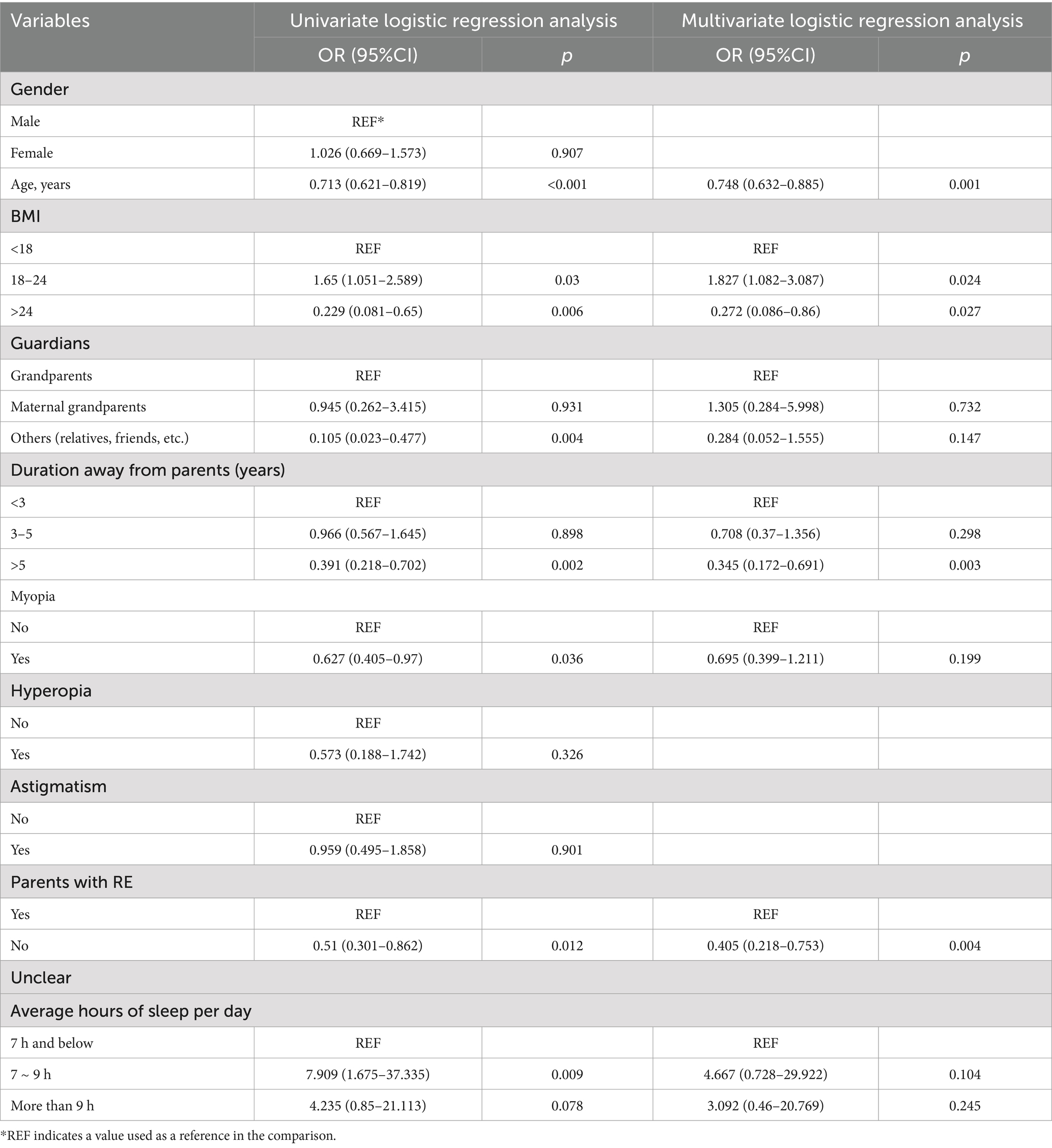
Table 5. Multivariate logistic regression analysis of factors associated with the better knowledge of refractive error among left-behind children of migrant workers.
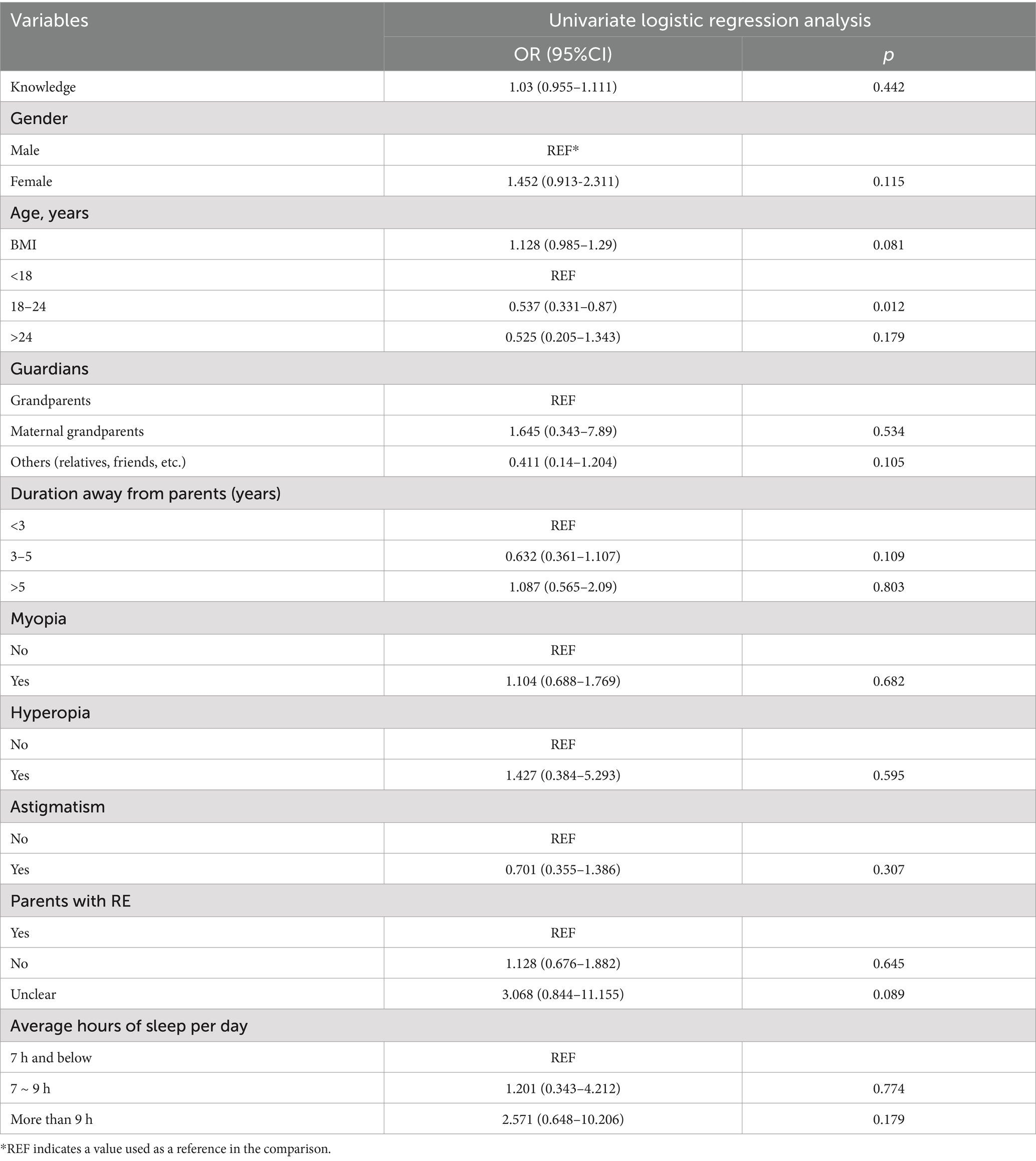
Table 6. Univariate logistic regression analysis of factors associated with more positive attitude toward refractive error among left-behind children of migrant workers.
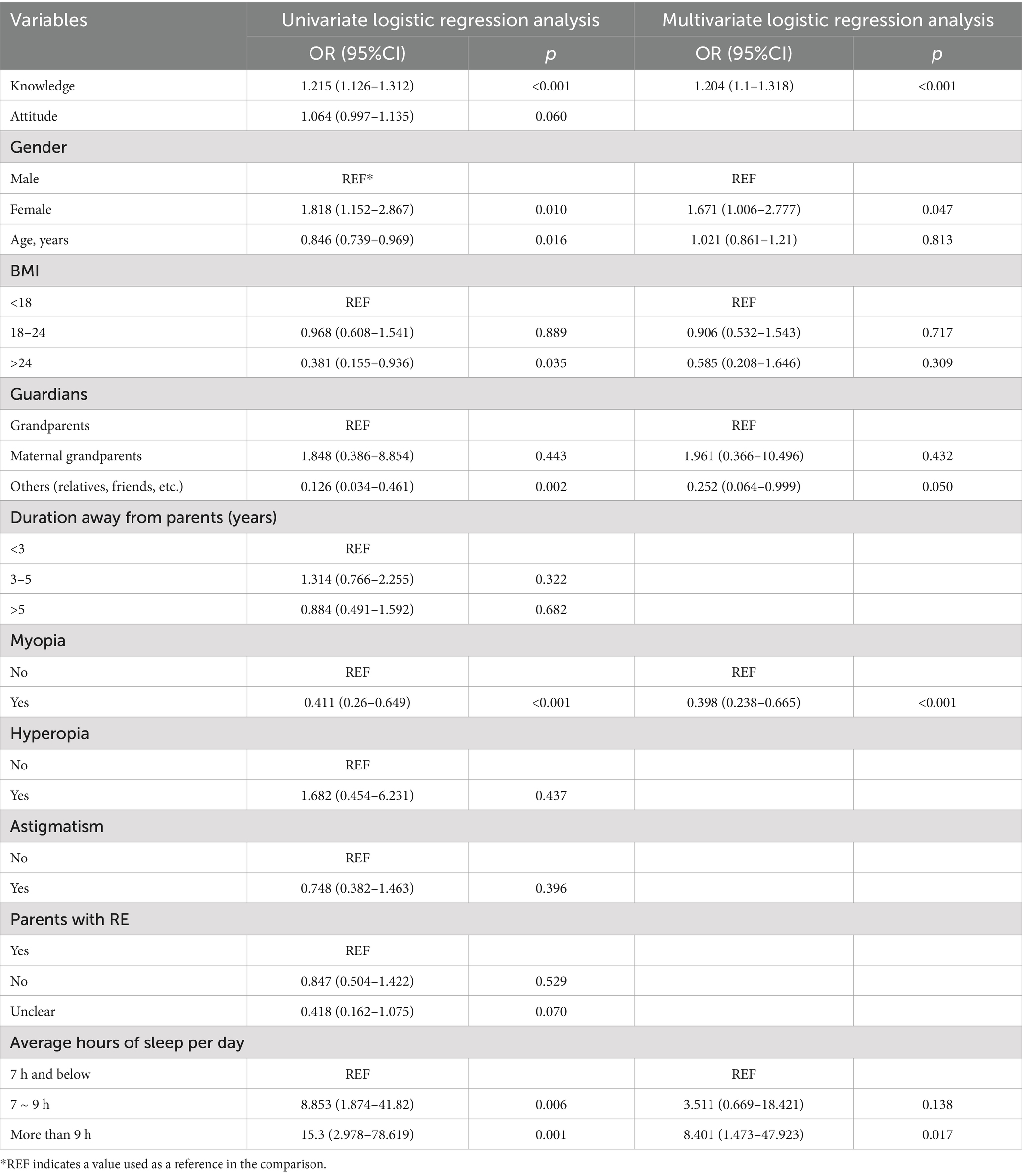
Table 7. Multivariate logistic regression analysis of factors associated with better practice regarding refractive error among left-behind children of migrant workers.
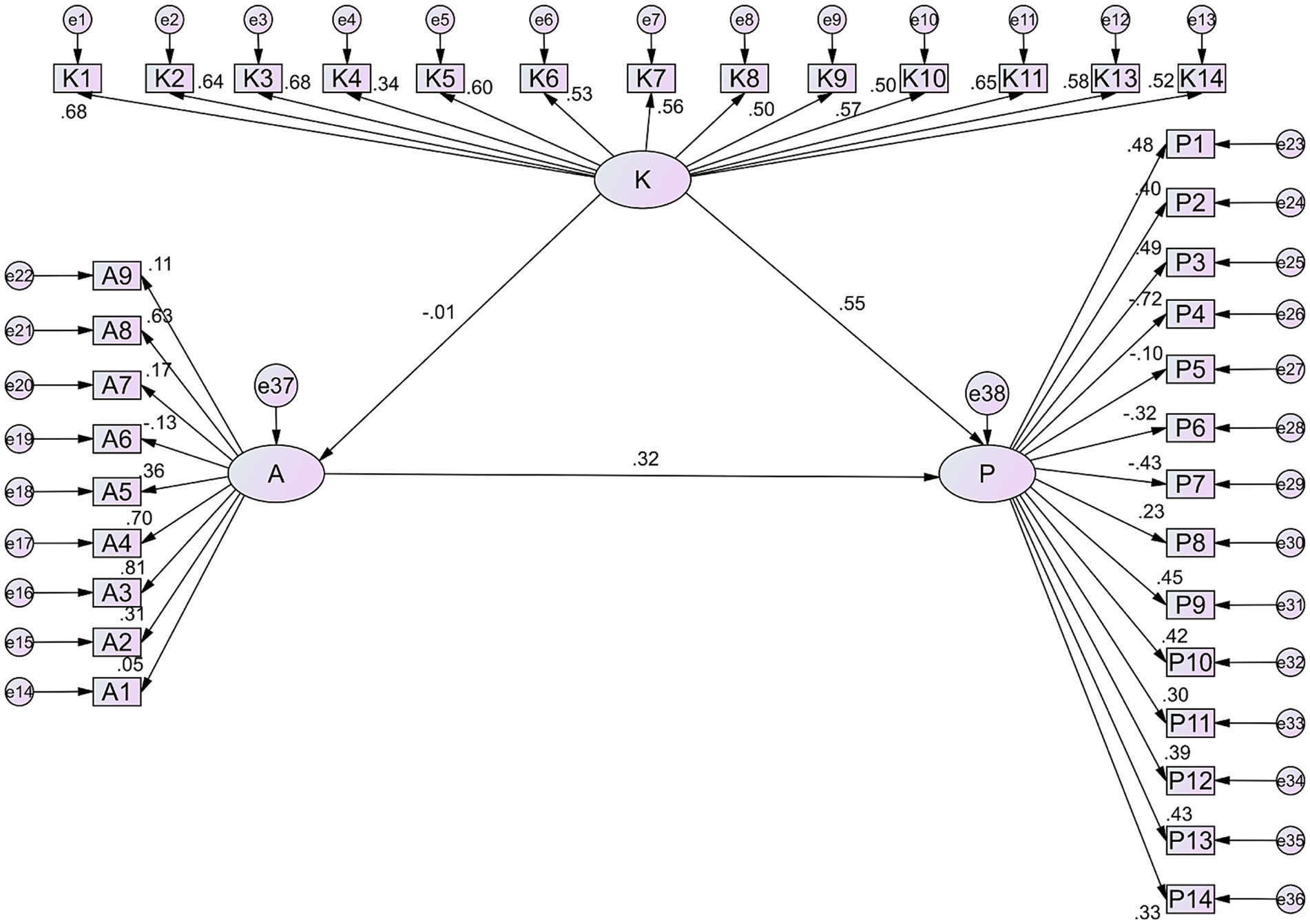
Figure 1. The structural equation model. The structural equation model is a comprehensive statistical approach to testing hypotheses about relations among observed (Knowledge, Attitude, and Practice) and latent variables (the questions for each dimension, such as K1 ~ K14). (1) Graphic shape: The latent variables are typically represented by ellipses or circles, observed variables are generally depicted as rectangles or squares, and error terms are illustrated by small circles connected to the corresponding observed variables. (2) Arrows: The arrows and coefficients among the three KAP constructs indicate both the direction and strength of the relationships between the latent variables. The small circles associated with A and P represent the residual terms. A unidirectional arrow signifies the direction of causation, specifically from cause to effect. When an arrow points from one latent variable to another, it indicates that the former exerts a direct effect on the latter. Conversely, if the latent variable is directed from the observed variable, it signifies that the latent variable is represented by that observed variable. (3) Number: The numerical value on the arrow connecting the latent variable to the observed variable signifies the factor loading, which reflects the strength of the association between the observed variable and the latent variable, specifically the regression coefficient of the observed variable with respect to the latent variable. A positive value indicates a positive correlation, suggesting that as the latent variable increases, the observed variable also tends to increase; conversely, a negative value indicates a negative correlation, implying that as the latent variable increases, the observed variable tends to decrease. The figure was created by AMOS software.
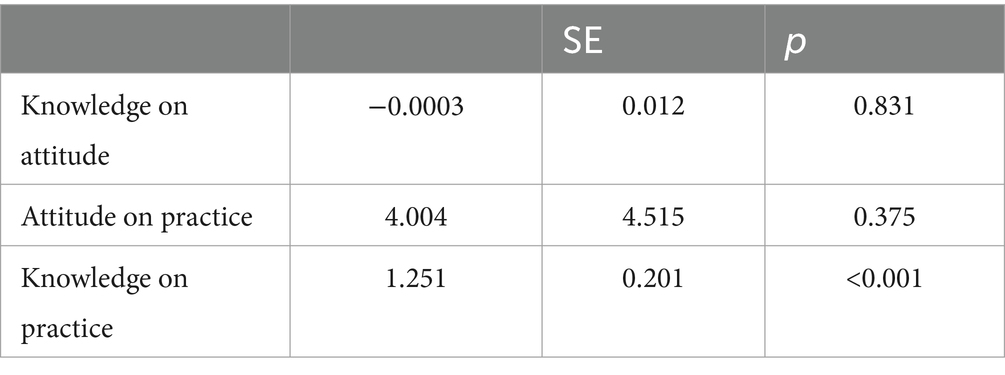
Table 8. Structural equation modeling of relationship between knowledge, attitude and practice toward refractive error (RE) in left-behind children of migrant workers.
4 Discussion
This study demonstrated that left-behind children of migrant workers might have sufficient knowledge, positive attitude and proactive practice toward RE management, which were possibly influenced by child’s age and gender, RE in parents and duration of living without parents, as well as the duration of children’s sleep per day. These results are specific for the population and might be used to correct the course of eye care education programs currently in use.
Due to the recent rise in the ocular disease burden worldwide, correction of the RE attracts significant scientific interest (27). This study assesses one of the vulnerable populations, such as young children of migrant workers who were left in care of temporary guardians, but the resulting KAP scores in children were not significantly lower than previously reported for parents. In particular, in the study by Assefa et al. (14) the overall proportion of high school children who had good knowledge and a favorable attitude toward RE was 53.8 and 52.1%, respectively. Other studies in school children or young adults demonstrated comparable or lower scores (28–30). In this study, around 10% of participants reported unacceptable practice of eye care. Promising results are at least partly explained by the strong school educational and practical programs – more than half of responders participated in seminars or activities related to the eye health care, organized by schools, and more than 90% occasionally performed eye exercises at school. Rate of eyesight checks in the schools was also higher compared to some other reports (16, 20), but still 8% of children under the care of temporary guardians never had their eyesight checked. Although procedure is obligatory in schools, those results draw special attention to the fact that a notable proportion of children might miss it, most likely due to the recent COVID epidemic and online schooling.
Unfavorable attitude of parents or guardians toward RE correction can have long-term consequences in children, leading to the loss of educational opportunities, loss of economic gain in the future and impaired quality of life (14, 15). In previous reports around 1/3 of responders were against wearing spectacles due to esthetic reasons or believes that wearing could damage their eyes (14, 19, 21). In line with that, 1/3 responders in this study answered that they do not believe in necessity of wearing glasses even if vision is not clear, citing concerns related to the appearance and self-esteem. Interesting to note that knowledge scores were getting lower as the child in responders’ care get older, with the most notable difference between grade one-four and grade five-seven students. Those observations contrast with the previous studies, where knowledge was getting better depending on age, with university students demonstrating more responsibility in eye care (14, 16). It might be at least partly explained by the natural transfer of responsibility from the guardian to child, as the child is getting older and more independent. There is another probability that children of older age experienced longer separation from their parents – knowledge scale scores in this study were also lower with the longer duration of separation. Attitude scores were increasing gradually with child’s age and duration of separation from parents, demonstrating the increasing responsibility in self-care, while practice scores were distributed sporadically. Moreover, the weak inverse correlation was found between knowledge and attitude, but was not confirmed by SEM, suggesting that attitude scores might be influenced by other factors rather than knowledge; guardians getting older as children growing, and duration of separation from working parents are likely to be among those factors. Therefore observed changes might be peculiar for the study population and should be taken into account during the future educational interventions.
It is important to note that this study found that children who get to sleep <7 h per day had considerably lower knowledge and practice scores, compared to those who sleep more. Overall proportion of participants with poor sleep quality among children was only 3.14%, which is not higher compared to the population of children living with parents in China; but with the older age this number could potentially became much higher (31, 32). In the previous study undertaken among Chinese school students, incidence of myopia increased with the decrease in sleep duration (7). In addition to authors discussing various influencing factors, such as oxidative stress and longer usage of electronic devises in children with insomnia, eye hygiene and eye care might also contribute to the development of myopia and other RE cases.
According to previous surveys, majority of school-year children obtain their information regarding eye-care from family rather than teachers (15, 18). With parents away due to the labor migration, the temporary guardians need to fulfill the role of reliable information source. Although it was shown before that knowledge and practice regarding RE was lacking in Chinese parents (19, 21), majority of participants in this study demonstrated acceptable results. However, in the small sub-population of children whose guardians other than grandparents, KAP scores were disturbingly low, suggesting that this group is the most vulnerable; relationship to the child other than grandparents was independently associated with lower practice scores. In addition, many children in the absence of parental guidance look for supplement information on the internet, such as Tiktok videos. Recent study by Ming et al. (33) discussed that myopia-related content on Tiktok should be treated with caution, pointing out moderate-to-poor reliability and variable quality across video sources; providing access to the comprehensive and accurate information should be, therefore, a priority in planning educational programs.
This study has some limitations. The sampling was limited by the need to obtain the information of the “migrant worker” status of parents from schools, and originally planned sample size was not reached; furthermore, the number of questionnaires distributed in each area was decided by research assistants, which might have led to selection bias. In addition, the target group was left-behind children from remote and economically disadvantaged regions, also, most of their guardians were older adult, and thus the initial idea to use combination of paper and electronic questionnaires to broaden sampling returned poor results. This study was focused on left-behind children, however, the actual presence of RE in children has not been confirmed by cycloplegic refraction. While sufficient KAP are essential for the RE prevention regardless current status, we discussed distribution of RE based on the school examination reports, thus there is a possibility that reported numbers might not reflect the overall population. Finally, social expectations bias is applicable for the majority of questions, as the responders might have chosen answers they perceive to be “right.”
5 Conclusion
In conclusion, left-behind children of migrant workers might have mostly sufficient knowledge, positive attitude and proactive practice toward RE management, which were possibly influenced by child’s age and gender, RE in parents and duration of living without parents, as well as duration of children’s sleep per day.
Data availability statement
The original contributions presented in the study are included in the article/supplementary material, further inquiries can be directed to the corresponding author.
Ethics statement
The study has been ethically approved by the Ethics Committee of Beijing Jishuitan Hospital. All methods were performed in accordance with the relevant guidelines and regulations. The patients/participants legal guardian/next of kin provided written informed consent to participate.
Author contributions
SL: Conceptualization, Data curation, Formal analysis, Resources, Writing – original draft, Writing – review & editing. GY: Conceptualization, Methodology, Project administration, Writing – original draft, Writing – review & editing. QL: Formal analysis, Methodology, Writing – original draft, Writing – review & editing. RP: Investigation, Project administration, Writing – original draft, Writing – review & editing. ST: Data curation, Formal analysis, Investigation, Writing – original draft, Writing – review & editing.
Funding
The author(s) declare financial support was received for the research, authorship, and/or publication of this article. This study was supported by the Study on health management of left-behind children, National Health Commission, PRC. The funders had no role in study design, data collection and analysis, decision to publish, or preparation of the manuscript.
Conflict of interest
The authors declare that the research was conducted in the absence of any commercial or financial relationships that could be construed as a potential conflict of interest.
Publisher’s note
All claims expressed in this article are solely those of the authors and do not necessarily represent those of their affiliated organizations, or those of the publisher, the editors and the reviewers. Any product that may be evaluated in this article, or claim that may be made by its manufacturer, is not guaranteed or endorsed by the publisher.
Supplementary material
The Supplementary material for this article can be found online at: https://www.frontiersin.org/articles/10.3389/fpubh.2024.1373209/full#supplementary-material
References
1. Boote, C, Sigal, IA, Grytz, R, Hua, Y, Nguyen, TD, and Girard, MJA. Scleral structure and biomechanics. Prog Retin Eye Res. (2020) 74:100773. doi: 10.1016/j.preteyeres.2019.100773
2. Irving, EL, Machan, CM, Lam, S, Hrynchak, PK, and Lillakas, L. Refractive error magnitude and variability: relation to age. J Optom. (2019) 12:55–63. doi: 10.1016/j.optom.2018.02.002
3. Vision Loss Expert Group of the Global Burden of Disease Study; GBD 2019 Blindness and Vision Impairment Collaborators . Global estimates on the number of people blind or visually impaired by uncorrected refractive error: a meta-analysis from 2000 to 2020. Eye. (2024) 38:2083–101. doi: 10.1038/s41433-024-03106-0
4. GBD 2019 Blindness and Vision Impairment Collaborators; Vision Loss Expert Group of the Global Burden of Disease Study . Causes of blindness and vision impairment in 2020 and trends over 30 years, and prevalence of avoidable blindness in relation to VISION 2020: the right to sight: an analysis for the global burden of disease study. Lancet Glob Health. (2021) 9:e144–60. doi: 10.1016/s2214-109x(20)30489-7
5. Cao, H, Cao, X, Cao, Z, Zhang, L, Han, Y, and Guo, C. The prevalence and causes of pediatric uncorrected refractive error: pooled data from population studies for global burden of disease (GBD) sub-regions. PLoS One. (2022) 17:e0268800. doi: 10.1371/journal.pone.0268800
6. Hashemi, H, Fotouhi, A, Yekta, A, Pakzad, R, Ostadimoghaddam, H, and Khabazkhoob, M. Global and regional estimates of prevalence of refractive errors: systematic review and meta-analysis. J Curr Ophthalmol. (2018) 30:3–22. doi: 10.1016/j.joco.2017.08.009
7. Lin, S, Gong, Q, Wang, J, Gao, H, Hong, J, Guo, Y, et al. The association between sleep duration and risk of myopia in Chinese school-aged children: a cross-sectional study. Sleep Breath. (2023) 27:2041–7. doi: 10.1007/s11325-023-02794-4
8. Thorn, F, Chen, J, Li, C, Jiang, D, Chen, W, Lin, Y, et al. Refractive status and prevalence of myopia among Chinese primary school students. Clin Exp Optom. (2020) 103:177–83. doi: 10.1111/cxo.12980
9. You, Y, Fu, J, Xu, M, Song, Y, Zhou, H, and Wei, S. Prevalence of refractive error among Chinese preschool children: the Changsha children eye study. Front Public Health. (2022) 10:1019816. doi: 10.3389/fpubh.2022.1019816
10. Rodriguez, NM, Acevedo, A, Torres, VP, and Romero, AF. Refractive error changes due to COVID-19 pandemic confinement in children from Puerto Rico: a retrospective study. Optom Vis Sci. (2023) 100:638–44. doi: 10.1097/opx.0000000000002055
11. Saara, K, Swetha, S, Subhiksha, R, Amirthaa, M, and Anuradha, N. Steep increase in myopia among public school-going children in South India after COVID-19 home confinement. Indian J Ophthalmol. (2022) 70:3040–4. doi: 10.4103/ijo.IJO_40_22
12. Burton, MJ, Ramke, J, Marques, AP, Bourne, RRA, Congdon, N, Jones, I, et al. The lancet Global Health Commission on global eye health: vision beyond 2020. Lancet Glob Health. (2021) 9:e489–551. doi: 10.1016/s2214-109x(20)30488-5
13. Ocansey, S, Amuda, R, Abraham, CH, and Abu, EK. Refractive error correction among urban and rural school children using two self-adjustable spectacles. BMJ Open Ophthalmol. (2023) 8:e001202. doi: 10.1136/bmjophth-2022-001202
14. Assefa, NL, Tegegn, MT, and Wolde, SY. Knowledge and attitude of refractive error among public high school students in Gondar City. Clin Optom. (2021) 13:201–8. doi: 10.2147/opto.s322438
15. Alhibshi, N, Kamal, Y, Aljohany, L, Alsaeedi, H, Ezzat, S, and Mandora, N. Attitude toward refractive error surgery and other correction methods: a cross-sectional study. Ann Med Surg. (2021) 72:103104. doi: 10.1016/j.amsu.2021.103104
16. Zeried, FM, Alnehmi, DA, and Osuagwu, UL. A survey on knowledge and attitude of Saudi female students toward refractive correction. Clin Exp Optom. (2020) 103:184–91. doi: 10.1111/cxo.12919
17. Li, Q, Guo, L, Zhang, J, Zhao, F, Hu, Y, Guo, Y, et al. Effect of school-based family health education via social media on children’s myopia and parents’ awareness: a randomized clinical trial. JAMA Ophthalmol. (2021) 139:1165–72. doi: 10.1001/jamaophthalmol.2021.3695
18. Almujalli, AA, Almatrafi, AA, Aldael, AA, Almojali, HA, Almujalli, AI, and Pathan, A. Knowledge, attitude, and practice about myopia in school students in Marat city of Saudi Arabia. J Family Med Prim Care. (2020) 9:3277–80. doi: 10.4103/jfmpc.jfmpc_86_20
19. Kaur, K, Kannusamy, V, Gurnani, B, Mouttapa, F, and Balakrishnan, L. Knowledge, attitude, and practice patterns related to digital eye strain among parents of children attending online classes in the COVID-19 era: a cross-sectional study. J Pediatr Ophthalmol Strabismus. (2022) 59:224–35. doi: 10.3928/01913913-20211019-01
20. Alrasheed, SH, Naidoo, KS, and Clarke-Farr, PC. Attitudes and perceptions of Sudanese high-school students and their parents towards spectacle wear. African Vision Eye Health. (2018) 77:1–7. doi: 10.4102/aveh.v77i1.392
21. Huang, Y, Chen, Z, Wang, B, Zhao, J, Zhou, X, Qu, X, et al. Chinese parents’ perspective on myopia: a cross-sectional survey study. Ophthalmol Ther. (2023) 12:2409–25. doi: 10.1007/s40123-023-00743-8
22. Fellmeth, G, Rose-Clarke, K, Zhao, C, Busert, LK, Zheng, Y, Massazza, A, et al. Health impacts of parental migration on left-behind children and adolescents: a systematic review and meta-analysis. Lancet. (2018) 392:2567–82. doi: 10.1016/s0140-6736(18)32558-3
23. Botezat, A, and Pfeiffer, F. The impact of parental labour migration on left-behind children's educational and psychosocial outcomes: evidence from Romania. Popul Space Place. (2020) 26:e2277. doi: 10.1002/psp.2277
24. Du, K, Yang, T, Zhao, J, and Guan, H. The impact of parental migration on left-behind children's vision health in rural China. BMC Public Health. (2023) 23:2. doi: 10.1186/s12889-022-14962-4
26. Kang, M-T, Li, S-M, Peng, X, Li, L, Ran, A, Meng, B, et al. Chinese eye exercises and myopia development in school age children: a nested case-control study. Sci Rep. (2016) 6:28531. doi: 10.1038/srep28531
27. Harb, EN, and Wildsoet, CF. Origins of refractive errors: environmental and genetic factors. Annu Rev Vis Sci. (2019) 5:47–72. doi: 10.1146/annurev-vision-091718-015027
28. Domi, N, Manoj, P, Peter, P, D’Souza, P, Jose, R, Roy, R, et al. A study to assess the knowledge regarding refractive errors among high school students in selected high schools Mangaluru with a view to prepare information booklet. Indian J Public Health Res Dev. (2020) 11. doi: 10.37506/ijphrd.v11i4.4562
29. Alruwaili, WS, Alruwaili, MS, Alkuwaykibi, MK, and Zaky, KA. Prevalence and awareness of refractive errors among Aljouf university medical students. Egypt J Hosp Med. (2018) 70:29–32. doi: 10.12816/0042958
30. Alrasheed, SH, and Alghamdi, WM. Parents’ awareness of and perspectives on childhood refractive error and spectacle wear in Saudi Arabia. Sultan Qaboos Univ Med J. (2022) 22:532–8. doi: 10.18295/squmj.10.2021.141
31. Zhai, X, Zeng, J, Eshak, ES, Zhang, Y, Yang, M, Di, L, et al. The influencing factors of sleep quality among Chinese junior and senior high school adolescents during the COVID-19 pandemic. J Trop Pediatr. (2021) 67:67. doi: 10.1093/tropej/fmab069
32. Zhang, Y, Huang, Z, Zhang, M, Li, C, Zhao, Z, Zhang, X, et al. Sleep status among children and adolescents aged 6-17 years - China, 2016-2017. China CDC Wkly. (2023) 5:11–6. doi: 10.46234/ccdcw2023.003
Keywords: refractive errors, Ophthalmology, left-behind children, knowledge, attitudes, practice, cross-sectional study
Citation: Liu S, Yang G, Li Q, Pei R and Tang S (2025) Knowledge, attitudes and practice toward refractive errors management among left-behind children of migrant workers. Front. Public Health. 12:1373209. doi: 10.3389/fpubh.2024.1373209
Edited by:
Gilbert Yong San Lim, SingHealth, SingaporeReviewed by:
Ellen Svarverud, University of South-Eastern Norway, NorwayLawrence Grabau, University of Kentucky, United States
Copyright © 2025 Liu, Yang, Li, Pei and Tang. This is an open-access article distributed under the terms of the Creative Commons Attribution License (CC BY). The use, distribution or reproduction in other forums is permitted, provided the original author(s) and the copyright owner(s) are credited and that the original publication in this journal is cited, in accordance with accepted academic practice. No use, distribution or reproduction is permitted which does not comply with these terms.
*Correspondence: Shuang Liu, bGl1c2h1YW5nX2pzdEAxMjYuY29t
 Shuang Liu
Shuang Liu Guang Yang
Guang Yang